Description of the map: The map depicts the East Mediterranean region. In blue: areas claimed by Greece and the Republic of Cyprus. In red: Areas claimed by Turkey. «A-B Section»: asserted delimitation between Turkey and Libya as per November 2019 agreement between Turkey and Libyan GNA. «C-D Section»: delimitation agreed between Greece and Egypt as per the August 2020 agreement.
In light of hydrocarbon reserves discovered in the East Mediterranean, the attention has shifted again towards this corner of the Mediterranean, where Europe meets the Middle East.
This article is part of a trilogy that explores the latest challenges East Mediterranean experiences. The first article sheds light on the particularities of this region and how the recent hydrocarbon findings have contributed to the current crises, while the second part explores the profile of the regional states, which influence one way or another the future of the region.
It is now time to study the long-term disputes that jeopardise the stability and prosperity of the East Mediterranean – directly or indirectly – under the light of the hydrocarbon discoveries in the region.
Unearthing old disputes along with gas deposits
A summary of the disputes discussed below is as follows:
- the Israel-Palestine conflict
- the Israel-Lebanon maritime dispute
- the Turkey-Cyprus dispute
- the Greek-Turkish tense relations
- the Libyan war
- the South-Caucasus conflict
The Israel-Palestine conflict
Despite the tense relationship between the Israelis and Palestinians, political experts view the discovery of energy resources as a positive outcome that could benefit both sides.
Given that both parties cooperate for the gas extraction to cover their domestic and regional demand, an opportunity arises for this long-term conflict to dissipate gradually.
Indeed, the Palestinian gas could bridge the gap between the Israeli and Arab world. As Haaretz suggests, starting with the gas and electricity trade, the two communities could get closer and subsequently deepen their trade relations with other industries (Bar-Eli, 2018).
If, however, the opportunity to exploit disputed areas is missed, it might exacerbate bilateral relations and endanger regional stability.
The Israel-Lebanon maritime dispute
The discovery of hydrocarbon reserves in the Lebanese territory stirred up local interest in the potential of offshore gas explorations. The only problem here is the lack of a delimitation agreement with Israel that defines the maritime borders between the two countries.
Hence, the Lebanese interests collide with the Israeli claims on its EEZ, which appears as another destabilising factor for regional peace.
The Turkey-Cyprus dispute
Since the island division, Turkish-Cypriot relations have been at their lowest point.
For 45 years now, any past peace talks have failed dramatically, as each side holds a different view on the resolution of the Cypriot issue. What’s more, the discovery of energy resources in Cyprus has perplexed the situation further. Despite the differences, however, the coexistence of the two communities urges the need to distribute the earnings proportionately.
For Turkey, the unification should come before any arrangement for the gas earnings distribution between the North (under the Turkish Republic of Northern Cyprus – TRNC – rule) and the South (under the Republic of Cyprus – RoC – jurisdiction).
On the same line, RoC also believes that resolving the division status of the island is vital for the future of Cyprus. But most importantly, it considers that the management of the gas reserves should not compromise its sovereign rights by any means. If necessary, gas exploitation should not affect the status quo in Cyprus.
Another point of conflict is the legitimacy of the two entities ruling the North and South of the island. According to the United Nations, the Republic of Cyprus has been an independent state since 1960 and constitutes a member of the United Nations (United Nations, 2022). As for the Turkish Republic of Northern Cyprus, the US Department of State notes that only Turkey has recognised it (United States Department of State).
The above issue has caused many controversies emanating from Turkey’s side over the decisions of RoC to shape the future of the island:
- In 2004, RoC proclaimed its Exclusive Economic Zone (EEZ) within 200 miles from its baseline, as UNCLOS foresees.
- Four years later, it initiated the bidding process for licencing the offshore hydrocarbon exploration in the South, Southeast and Southwest of the island (Skordas, 2007).
- Shortly after the declaration of its EEZ, the Republic of Cyprus pursued the demarcation of its maritime borders with neighbouring countries. Based on the principles of international customary law and the UNCLOS¹, the delimitation agreements with Egypt, Lebanon, and Israel were successful.
An important note here is that Turkey does not recognise the Cypriot EEZ. On this basis, Ankara reacted to the Cypriot delimitation agreements by signing similar deals with Northern Cyprus and Libya. Additionally, it attempted to freeze further gas exploitation in Cyprus from international oil companies.
In parallel, Turkish vessels carried out gas exploration tests in disputed areas. This fact caused the immediate EU reaction in February 2020. The bloc decided to impose sanctions on Turkish officials that held positions in the state-owned Turkish Petroleum Corporation.
The Greek-Turkish tense relations
The recent maritime dispute² between the two countries has reignited to the extent that many feared an armed conflict.
A similar event erupted in 1997, known as the Imia-Kardak crisis. Back then, the two countries were about to engage in warfare. Fortunately, the US averted the war thanks to NATO and its prevention measures which apply to conflicts between fellow states.
In the wake of hydrocarbon reserves in the Mediterranean, Greece has expressed the desire to explore its potential. For this reason, Athens started contacting surveys in its territorial waters. However, these efforts clashed with Turkish interests in the area. In principle, Turkey refuses to recognise that small Greek Islands have EEZ and therefore considers that such actions violate its sovereign rights.
Adding more fuel to the conflict, the maritime agreement between Egypt and Greece sparked Turkey’s reaction. The result was the signature of a similar treaty between Turkey and Libya in 2020. The deal marked the maritime boundaries between the two countries, which comprise contested areas with Greece and Cyprus.
To prove their rights, both Greece and Turkey have employed arguments that lean on different variables. For Greece, the answer lies in the UN Convention on the Law Of Sea (UNCLOS). According to the convention, inhabited islands with economic activity have an exclusive economic zone (EEZ).
On the other hand, Turkey, as a non-cosignatory state of the UNCLOS, questions whether the islands should have the same EEZ as the mainland. To determine the island’s economic zone, Turkey advocates that multiple parameters should apply; one of them is the size of the island. Additionally, Turkey firmly believes that old treaties signed between Greece and Turkey are unfair to modern Turkey. Given this argument, the treaties of Sevres in 1920 and Lausanne in 1923 exploited the collapse of the Ottoman Empire.
This crash resulted in other countries being pulled into the conflict, including Italy, France, and the United Arab of Emirates (UAE). Especially for France and the UAE, Turkey’s new plans overlap with their interests in the Middle East and North Africa (Tuysuz, 2020).
The Libyan War
The recent civil war in Libya is another example of internal conflict that endangers regional stability. Inevitably, this clash dragged global and regional powers. On one side, Turkey supported the UN-endorsed government that fights against General Khalifa Haftar. On the other end, a group of countries backed Haftar including Russia, France, Egypt, the United Arab Emirates, and Saudi Arabia.
Soon, the conflict in Libya has taken the form of a proxy war, with outside powers transferring their old enmities to the Libyan territory and engaging in warfare with each other.
As for Turkey’s involvement, this move can be translated as an action to secure an ally in the region. After two strategic deals, its influence has deepened in the current Libyan affairs. As a result, Turkey clashed with France and United Arab Emirates’ interests. As mentioned above, both countries hold equal geostrategic interests in the area. In return, they decided to participate with Greece and Cyprus in joint military exercises in the East Mediterranean.
The South-Caucasus conflict
In October 2020, a long-term dispute in South Caucasus broke out into an open conflict. Turkey’s position was to declare its solidarity with its long-term ally Azerbaijan.
Despite the attempts of outside powers to establish peace, Turkey encouraged the Azeri President to continue the fight. The outcome was a diverse group of states got closer and form coalitions against Turkey’s new plans. Thus, the latter has become more and more isolated in the region.
Closing thoughts
The third article concludes the analysis of the East Mediterranean region. A few points that recap the challenges this region encounters:
- The discovery of hydrocarbon reserves has received mixed feelings about the future of the region. According to the optimistic scenario, the countries will seek cooperation in the energy sector. This development will bring stability and prosperity. In the opposite direction, the pessimistic scenario foresees clashes and competition between the regional players; an evolution that puts regional peace in peril.
- This new reality causes internal changes in the strategy of the regional players and reshuffles old partnerships.
- Old frictions have revived in the wake of energy findings in disputed areas.
Concluding, the Mediterranean is a region with many particularities and complicated geopolitics. The discovery of hydrocarbons might be the only opportunity for decision-makers: a) to promote energy cooperation across the region, and b) to create the conditions for economic prosperity.
Equally, all parties should be present at the negotiating table. Isolating Turkey and polarising the region will only aggravate the situation, which will feed the existing distrust and eventually lead to an uncertain future.
Photo: Future Perfect at Sunrise. Conflicting claims to EEZ/Continental Shelf areas in the Eastern Mediterranean between Greece, Turkey and Cyprus (2019). Source: (commons.wikimedia.org)| (CC0 1.0)
Footnotes
[1] The Principles of international customary law and the UNCLOS:
The delimitation of the EEZ follows a median line, which is equidistant from the nearest point of each baseline.
[2] The recent maritime dispute:
In 2020, Turkey dispatched Oruc Reis accompanied by other naval ships to conduct seismic surveys in the region. The objective was to map out the in-between area of the Turkish coast and the Greek Islands for hydrocarbon reserves.
Because Turkey launched its exploratory attempts in disputed areas, it led to diplomatic and military tension. At the same time, the decision to carry out maritime exercises at the same spots did not take long to spark Athens’ reaction.
The August 2020 episode led to a military escalation. Luckily, the withdrawal of the Turkish ship alleviated the tension amid fears of the imposition of EU sanctions. Regardless, Ankara announced that it would continue relevant activities to protect its blue homeland in the Aegean Sea (Reuters, 2020).
The reappearance of Turkish vessels in the South of Kastelorizo, a Greek island, only a few months after the first encounter, proves that the escalation is likely to continue.
Bibliography
Ant O. (2020) Turkey Urges EU States to End ‘Blind’ Support for Greece in Spat, Bloomberg, 11th of September, Available at: https://www.bloomberg.com/news/articles/2020-09-11/turkey-urges-eu-states-to-end-blind-support-for-greece-in-spat [Accessed 23/08/2021]
Anthony I. and Sahlin M. (2020) Maritime disputes in the eastern Mediterranean: Why and why now? Stockholm International Peace Research Institute, Available at: https://www.sipri.org/commentary/essay/2020/maritime-disputes-eastern-mediterranean-why-and-why-now [Accessed 26/08/2021]
Aydintasbas A. and Bianco C. (2021) Useful enemies: How Turkey – UAE rivalry is remaking the Middle East, European Council on Foreign Relations, 15th of March, Available at: https://ecfr.eu/publication/useful-enemies-how-the-turkey-uae-rivalry-is-remaking-the-middle-east/ [Accessed 26/08/2021]
De Carbonnel A., Ellinas C., Fabiani R., Grigoriadis I and Mandiraci B (2020) Rising Tensions n the Eastern Mediterranean, Overview of Event Recording, July, International Crisis Group, Published, Available at: https://www.crisisgroup.org/europe-central-asia/eastern-mediterranean/rising-tensions-eastern-mediterranean [Accessed 23/08/2021]
EURACTIV.com with AFP (2020) Gas fields and tensions in the eastern Mediterranean, EURACTIV, 26th of October, Available at: https://www.euractiv.com/section/energy-environment/news/gas-fields-and-tensions-in-the-eastern-mediterranean/ [Accessed 23/08/2021]
Giannakopoulos A. (2016) Energy Cooperation and Security in the Eastern Mediterranean: A Seismic Shift towards Peace or Conflict? Research Paper 8, The S. Daniel Abraham Center for International and Regional Studies, Tel Aviv University, Available at: https://www.ceps.eu/wp-content/uploads/2016/03/Energy%20Cooperation%20and%20Security%20in%20the%20Eastern%20Mediterranean%20small%20file.pdf [Accessed 30/08/2021]
Gulsun Saglamer, UN Chronicle: The Mediterranean Sea: Cradle of Civilization, United Nations, Available at: https://www.un.org/en/chronicle/article/mediterranean-sea-cradle-civilization [Accessed 23/08/2021]
International Crisis Group (2019) Steading the New Status Quo in Syria’s North East, Crisis Group Middle East Briefing No 72, Ankara/Qamishli/Brussels, 27th of November, Available at: https://www.crisisgroup.org/middle-east-north-africa/eastern-mediterranean/syria/b72-steadying-new-status-quo-syrias-north-east [Accessed 27/08/2021]
JINSA (2019) Sea Changes: US Challenges and Opportunities in the Eastern Mediterranean, JINSA Gemunder Center’s Easter Mediterranean Policy Project, Washington, August, Available at: https://jinsa.org/wp-content/uploads/2019/08/Sea-Changes-U.S.-Challenges-and-Opportunities-in-the-Eastern-Mediterranean.pdf [Accessed 27/08/2021]
Marcus J. (2020) The Eastern Mediterranean tinderbox: Why Greek-Turkish rivalries have expanded, BBC News, 25th of August, Available at: https://www.bbc.co.uk/news/world-europe-53906360 [Accessed 23/08/2021]
Nedos V. (2021) Delusions over the status quo, Ekathemerini.com, 16th of May, Available at: https://www.ekathimerini.com/opinion/1161034/delusions-over-the-status-quo/ [Accessed 26/08/2021]
Oğurlu E. (2012) Rising Tensions in the Eastern Mediterranean: Implications for Turkish Foreign Policy, Istituto Affari Internazionali (IAI) Available at: www.jstor.org/stable/resrep09804 [Accessed 26/08/2021]
Reuters Staff (2020) Greek-Turkish tensions rise in crisis over easter Mediterranean, Reuters, 12th of October, Available at: https://www.reuters.com/article/turkey-greece-int-idUSKBN26X2E8 [Accessed 23/08/2021]
Scazzieri L. (2020) CER Insight: Gas heats up the eastern Mediterranean, Centre for European Reform, 23rd of April, Available at: https://www.cer.eu/insights/gas-heats-eastern-mediterranean [Accessed 22/08/2021]
Sheppard D., Pitel L. and Peel M. (20202) What is at stake in the eastern Mediterranean crisis? The Financial Times, 8th of September, Available: https://www.ft.com/content/e872ed5d-1f64-48ae-8b8d-d6b49476e749 [Accessed 23/08/2021]
Skordas A. (2077) Oil Exploitation in the Eastern Mediterranean: Cyprus, Turkey and International Law, Remarks presented at Wilson Centre Event, University of Bristol School of Law, March, Published, Available at: https://www.wilsoncenter.org/event/oil-exploitation-the-eastern-mediterranean-cyprus-turkey-and-international-law [Accessed 22/08/2021]
Spencer M. S., Sitilides J., Lesser I., Norton R. S., Wimbush S. E., Binder D., Von Tersch E., Bryza M., Weston T., Meyer S. (2004) Unconventional Challenges in the Eastern Mediterranean: Strategic Engagement in a New Era, Executive Summary presented at Wilson Centre Event, Western Policy Centre, October, Available at: https://www.wilsoncenter.org/event/unconventional-challenges-the-eastern-mediterranean-strategic-engagement-new-era [Accessed 22/08/2021]
Tol G. (2020) Viewpoint: Why Turkey is flexing its muscles abroad, BBC NEWS, 16th of October, Available at: https://www.bbc.co.uk/news/world-europe-54547304 [Accessed 26/08/2021]
Tuysuz G. (2020) NATO allies are facing off in the Eastern Mediterranean. The conflict could entangle the entire region, CCN, 26th of August, Available at: https://edition.cnn.com/2020/08/25/europe/greece-turkey-eastern-mediterranean-tension-intl/index.html [Accessed 26/08/2021]
United Nations (2021) United Nations Peacekeeping Force in Cyprus, History, UNFICYP, Available at: https://unficyp.unmissions.org/history [Accessed 26/08/2021]
United States Department of State, A Guide to the United States History of Recognition, Diplomatic, and Consular Relations, by Country, since 1776: Cyprus, Office of the Historian, Foreign Service Institute, Available at: https://history.state.gov/countries/cyprus [Accessed 26/08/2022]
Wintour P. (2020) How a rush for Mediterranean gas threatens to push Greece and Turkey into war, The Guardian, 11th of September, Available at: https://www.theguardian.com/world/2020/sep/11/mediterranean-gas-greece-turkey-dispute-nato [Accessed 23/08/2021]

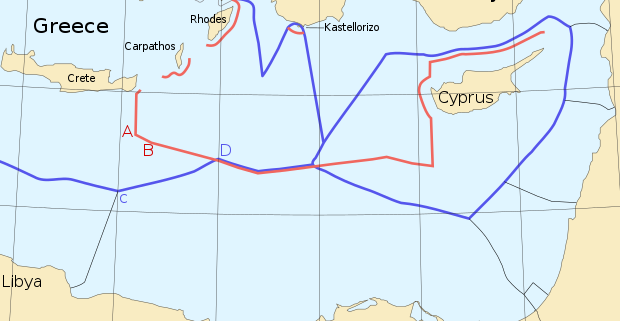
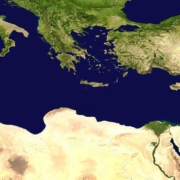
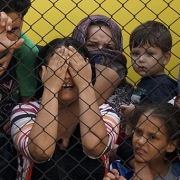
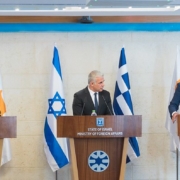

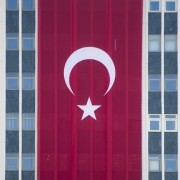



Leave a Reply
Want to join the discussion?Feel free to contribute!